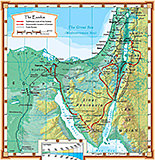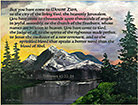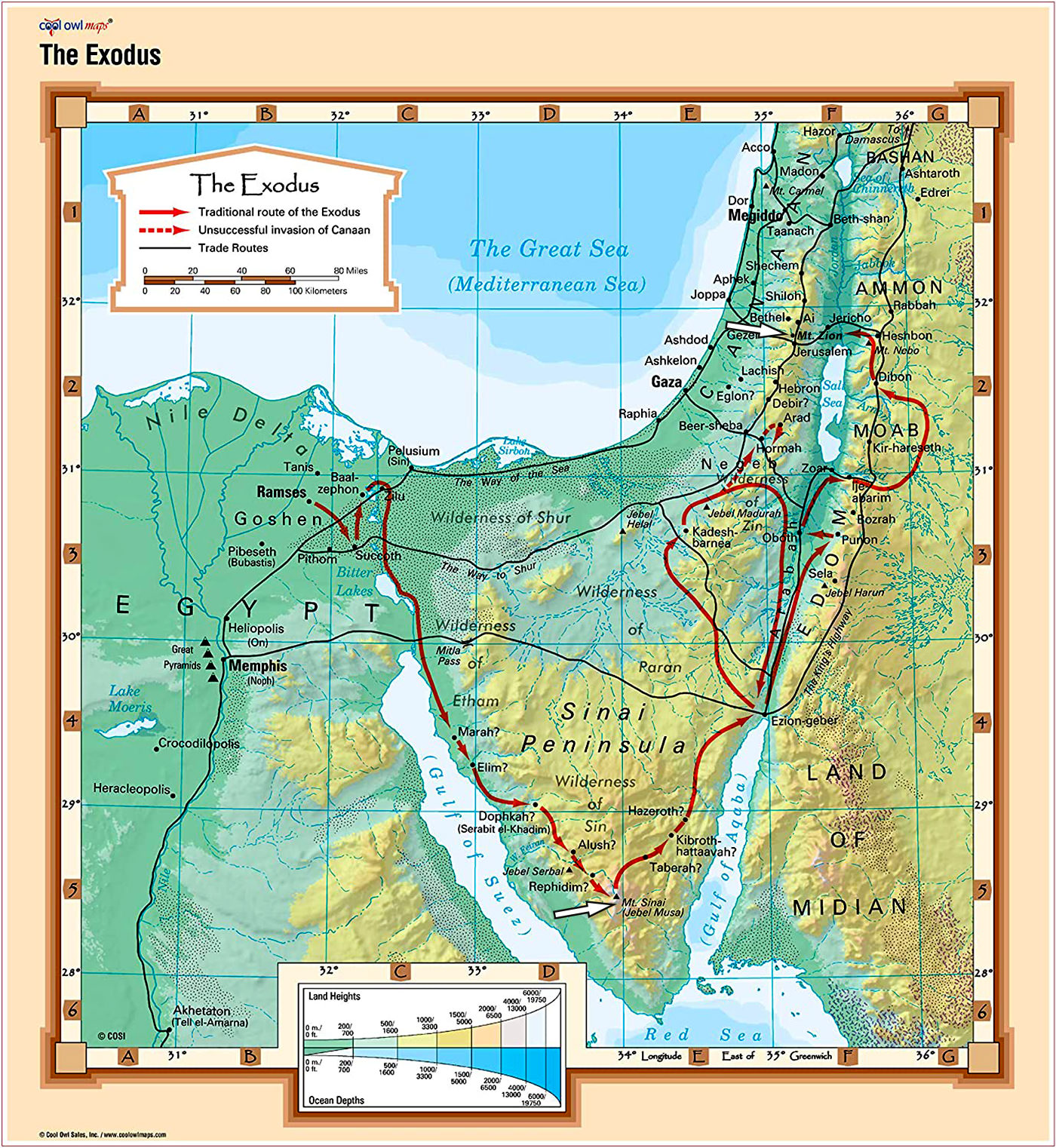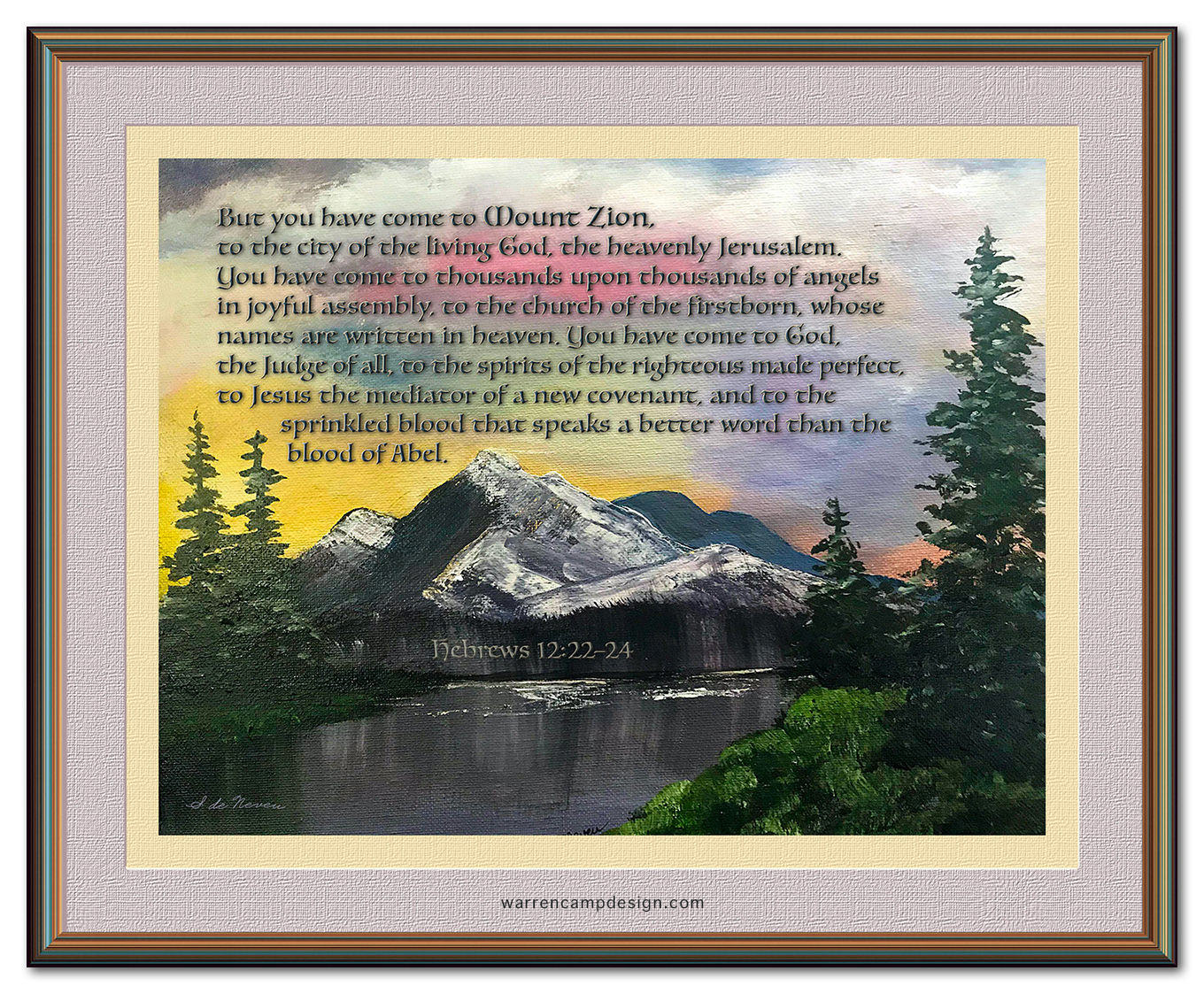Hebrews 12:18–29 . . .
“Glorifying God in Heaven”
As we come to chapter 12's closing passages, it's wise to recall what we reviewed in Warren's previous Bible-study commentary titled "Supporting One Another" (12:12–17): how and why we believers are to run the race of faith (12:12–13) while being warned and encouraged to live in peace and be holy (12:14–17). As we approach the end of this epistle, we find the author once again comparing the glory and perfection of the new covenant with the imperfection of the old.
Today's passage summarizes the variety of lessons presented in chapters 11 and 12. Those living under the new covenant have the advantage of looking to Christ, rather than to the Law. The old covenant was given through sinister signs, dismal missions, fire, and animal sacrifice; it focused on material things in a material world. But God presented himself as reserved and remote, symbolic of his holiness, which is why the new covenant offers something wholesome, beyond rituals and earthly priorities. In addition, Jesus symbolically permits us to approach God directly, which the old covenant couldn't allow.
The text herein alludes to Exodus 19 and the initial meeting at Sinai between God and the Israelites whom he redeemed from slavery in Egypt. At that point in redemptive history, Israel met with the Lord on earth. God descended from heaven and communed with the nation on a mountain. However, as Exod. 19 tells us, the Lord didn't meet with the whole nation, only with its covenant mediator — Moses. The people remained below, able to approach the holy mountain only after a period of cleansing. Even then, barriers were set up to keep anyone who was even potentially unclean from touching the mountain and causing God's holiness to break forth and destroy the camp (19:10–15).
Comparing Mount Sinai with Mount Zion (12:18–21)
The four opening verses are basically telling us: Unlike your ancestors, you didn’t come to Mount Sinai — all that volcanic blaze and earthshaking rumble — to hear God speak. The earsplitting words and soul-shaking message terrified them and they begged him to stop. When they heard the words — "If an animal touches the Mountain, it’s as good as dead" — they were afraid to move. Even Moses was terrified.
The Mountain of Fear and the Mountain of Joy
18You have not come to a mountain that can be touched and that is burning with fire; to darkness, gloom and storm; 19to a trumpet blast or to such a voice speaking words that those who heard it begged that no further word be spoken to them, 20because they could not bear what was commanded: “If even an animal touches the mountain, it must be stoned to death [from Exod. 19:12–13].” 21The sight was so terrifying that Moses said, “I am trembling with fear” (12:18–21).
The writer has begun to illustrate another advantage of the new covenant. We learn in Exod. 19:9–20 that, when God delivered written laws to Moses at Mount Sinai, he did so through threatening, alarming demonstrations, which included fire, clouds, audible trumpet blasts, and a holy mountain that neither man nor animal was allowed to stand on or even touch. Each of these inexplicable occurrences not only proved God's words to his people but caused terrifying fear (Heb. 12:21). This passage continues this letter's unswerving theme: the new covenant is superior to the old covenant.
Likely, it was God's objective, when he gave the old covenant to Israel, to shake up his people so they'd see him as being unconditionally holy, the one whom they were forbidden to approach in their sinful state. The purpose of this exhibition on Mount Sinai was to highlight the seriousness of this earlier covenant and the holiness of the God who'd made it. Man's separation from God was a major teaching aspect of the Law. The old covenant was established with a sense of trepidation, attempting to document man's sinful state and reveal his need for God in his life. As we'll realize in upcoming verses, Christ's new covenant has been presented to man with an attitude of peace and forgiveness.
Moses was one of the great heroes of faith mentioned in chapter 11's Hall of faith. It was he whom God called to climb up onto Mount Sinai so he'd be given the old covenant to present to the Israelites. Already commended for his faith (11:24–28), he's now been added to those who became frightened by God's old covenant presentation. Apparently, we're to see in Moses' behavior God's awesome presence, which was intended to awaken an undeniable type of reverence.
“But You Have Come to Mount Zion” (vv. 22–24)
The author then clarified the situation about God's unshakable kingdom, telling his audience, No, that’s not your experience at all. You’ve come to Mount Zion, the city where the living God resides. The invisible Jerusalem is populated by throngs of festive angels and Christian citizens. It's the city where God is Judge, with judgments that make us just. You’ve come to Jesus, who presents us with a new covenant, a fresh charter from God. He's the Mediator of this covenant. The murder of Jesus, unlike Abel’s — a homicide that cried out for vengeance — became a proclamation of grace.
22But you have come to Mount Zion, to the city of the living God, the heavenly Jerusalem. You have come to thousands upon thousands of angels in joyful assembly, 23to the church of the firstborn, whose names are written in heaven. You have come to God, the Judge of all, to the spirits of the righteous made perfect, 24to Jesus the mediator of a new covenant, and to the sprinkled blood that speaks a better word than the blood of Abel (12:22–24).
While verse 18 brings out the events on Mount Sinai, the author next contrasts that venue with Mount Zion. Commentator David Guzik makes these noteworthy contrasts between both mounts: "(1) Mount Sinai was marked by fear and terror — Mount Zion is a place of love and forgiveness; (2) Mount Sinai is in the desert — Mount Zion is the city of the Living God; (3) Mount Sinai spoke of earthly things — Mount Zion speaks of heavenly things; (4) At Mount Sinai, only Moses was allowed to draw near to God — at Mount Zion, an innumerable company, a general assembly is invited to draw near; (5) Mount Sinai was characterized by guilty men in fear — Mount Zion features just men made perfect; (6) At Mount Sinai, Moses was the mediator — at Mount Zion, Jesus is the mediator; (7) Mount Sinai brings an old covenant, which was ratified by the blood of animals — Mount Zion brings a new covenant, which is ratified by the blood of God’s precious Son; (8) Mount Sinai was all about exclusion, keeping people away from the mountain — Mount Zion is all about invitation; and (9) Mount Sinai is all about Law — Mount Zion is all about grace.
We must strengthen ourselves for our upcoming race because of the better days in which we live. We no longer live anticipating the Messiah's arrival; rather, we live now that the Messiah is already here. We've come to Mount Zion, only now it's not the physical Mount Zion. As the rest of v. 22 makes clear, it's the heavenly Mount Zion to which we've come — the heavenly city where perfection already reigns. In some ways, that statement seems hard to believe. After all, when we look around, we don't yet see perfection; it's hard to understand how we can be in the presence of "God, the judge of all, [and] to the spirits of the righteous made perfect" (v. 23b).
At present, there's a separation between what we experience and the realities of heaven. Yet, presently, by faith, there's no such separation. Christ has come and accomplished all of the work required to bring about renewal and consummation. In Jesus, our position has changed; this heavenly reality is guaranteed to become an earthly one as well.
So when the author declares, "But you have come to Mount Zion," he's urging his audience not to come to Mount Zion as if they were coming to Mount Sinai. Instead, they were to put away all their hesitation and definitively approach Father God. These Jewish Christians shouldn't have considered returning to and preferring the religion found of Mount Sinai. Instead, they were exhorted to seek and develop a most-wholesome, life-changing relationship on Mount Zion with Lord Jesus, the new covenant's mediator (v. 24). This new covenant also compares the blood sacrifice that Abel had made and presented to God — it was man's first sacrificial offering to God. As a result, Jesus' "sprinkled blood speaks a better word" than the blood of any animal sacrifice, even Abel's offering.
Shaking the Earth, Rocking the Heavens (vv. 25–27)
Next, the author warns his readers: So don’t turn a deaf ear to these gracious words. If those who ignored earthly warnings didn’t get away with it, what will happen to us if we turn our backs on heavenly warnings? His voice that time shook the earth to its foundations; this time — he’s told us this quite plainly — he’ll also rock the heavens: "One last shaking, from top to bottom, stem to stern." The phrase "one last shaking" means a thorough housecleaning, getting rid of all the historical and religious junk so that the unshakable essentials stand clear and uncluttered.
25See to it that you do not refuse him who speaks. If they did not escape when they refused him who warned them on earth, how much less will we, if we turn away from him who warns us from heaven? 26At that time his voice shook the earth, but now he has promised, “Once more I will shake not only the earth but also the heavens [from Haggai 2:6].” 27The words “once more” indicate the removing of what can be shaken — that is, created things — so that what cannot be shaken may remain (12:25–27).
Verse 25a orders us readers to attend to what comes next. Verse 25b then asks a very perplexing question that includes a pair of conditional "If"s that contrasts spoken warnings from earth versus those from heaven. While the consequences for rebelling at Mount Sinai were significant, they should be even greater when resisting God’s magnificent work at Mount Zion. The next verse immediately demonstrates how God had chosen to shake up the present order, causing the hard-pressed Jewish Christians to feel pressure and choose their future wisely.
Our choices have consequences! "Hebrews" was written to Jewish Christians who'd been wrestling various degrees of oppression and abuse. They were enticed to return to a more socially-acceptable theology and belief, despite all the author's evidence that documents conclusively the foolishness of that option. Verse 25 made it extremely clear that he who speaks — Christ and his gospel — represents truth; if we fail to abide in that truth, we're bound to suffer a spiritual catastrophe!
Prior verses compared the earthly scene at Mount Sinai to the heavenly scene that awaits every Christian believer. In v. 26, the writer once again invokes the way God spoke when he presented his old covenant to the Israelites at Mount Sinai, when "his voice shook the earth." The following affirmation, beginning with "Once more…" is a quotation taken from Haggai 2:6 (shown in the colored passage above). In it, God presents his a long-term forecast of his eventual recreation of "a new heaven and a new earth" since the first heaven and the first earth had passed away (Revelation 21:1). God will replace something temporary with something eternal. Verse 27 is a reiteration of the two previous verses: The old covenant was presented on the present earth, with a terrible spectacle that shook the ground (Exod. 19:9–20, shown above). It was replaced with the new covenant, which is presented in heaven and on the new earth.
Let Us Worship God Acceptably (vv. 28–29)
Finally, we're asked a couple of sobering, far-reaching questions: Do you see what we’ve got? An unshakable kingdom! And do you see how thankful we must be? Not only thankful, but brimming with worship, deeply reverent before God. For God isn't an indifferent bystander. He’s actively cleaning house, torching all that needs to burn; he won’t quit until it’s all cleansed. God himself is Fire!
28Therefore, since we are receiving a kingdom that cannot be shaken, let us be thankful, and so worship God acceptably with reverence and awe, 29for our “God is a consuming fire [from Deuteronomy 4:24]” (12:28–29).
The author's "Therefore" makes it clear: The kingdom we receive can never be shaken! So let's demonstrate our thankfulness by worshiping God most reverently. We're obliged to seize God’s unmerited awesome approval of Jesus, thereby encouraging us to serve him meaningfully and sufficiently. In v. 29, the writer quotes from Deut. 4:24, reminding his readers that "God is a consuming fire." That reference paints a colorful, memorable image that was used earlier (10:26–27) when he related to God's use of "raging fire that will consume the enemies of God," demonstrating his anger of those who defy him. God's holiness will eliminate everything temporary and worthless, leaving only what's eternal and alive, according to his unshakable will.
Charles Spurgeon (English Baptist preacher, 1834–1892) wrote this about God's unshakable kingdom: "Our kingdom cannot be moved! Not even dynamite can touch our dominion. No power in the world, and no power in hell, can shake the kingdom that God has given his saints. With Jesus as our monarch, we fear no revolution, no anarchy. For the Lord hath established this kingdom upon a rock; it cannot be moved or removed."
Closing Considerations
Our world will eventually be replaced by a new heaven and earth. The Lord continually strips away what is counterfeit and ungodly. We learn in v. 27 that this process will accelerate as the last days near. God will remove all that's unstable; what will remain cannot be shaken. In a world that oftentimes seems to be falling apart, believers in the Lord Jesus Christ have the privilege of sharing the best news imaginable: We have something that is stable, completely secure. There's a rock on which we're able to stand, and it cannot be shaken. That foundation, of course, is almighty God.
The Lord gives us other immovable truths as well. We can trust that Scripture is his unchanging, relevant truth for all time. We can forever depend on a secure eternal relationship with Father God through his Son. And we can be sure that an everlasting heavenly home awaits all those who place their faith in Jesus Christ. We can and will have stability, even in this unstable world.
We live in unsettling times. The more conditions worsen, the easier it is to see why Scripture refers to God as being "a consuming fire" (v. 29). He burns up all that displeases him. He'll continue doing that until the only ones left are the righteous who stand under Christ's lordship, awaiting his kingdom here on earth. Therefore, we must be careful to draw near to our Creator with reverence and awe, for he's "a consuming fire."
The remainder of the epistle written to the "Hebrews" focuses on those things that can be done to prepare us for our new race. As we follow the author's commands, the Holy Spirit will work through us, causing us to cling to Jesus. God will bring his children to faithfulness wherein we'll hold firmly to Christ. Let's receive these commands happily so that we'll continually live in gratitude after being welcomed coming into God's kingdom, which cannot be shaken!
- Q. 1 Why is Jesus’ blood better than the blood of Abel's sacrificial offering?
- Q. 2 Which fact about "our God" ought to be most present in our thoughts and decisions (v. 23, v. 29)?
Hebrews 12:18–29
New International Version (NIV) or view it in a different version by clicking here.
— Listen to chapter 12, narrated by Max McLean.




